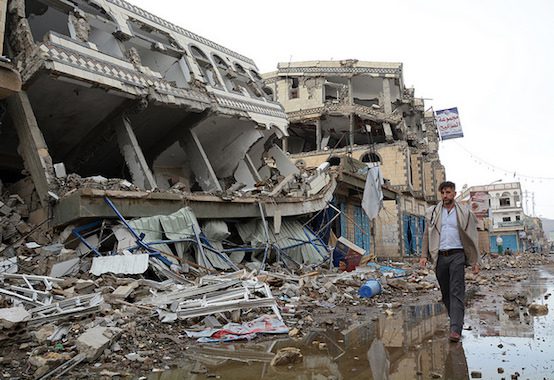Shameless Saudi Propaganda and the War on Yemen
By
The New York Times inexplicably gives the Saudi ambassador to the U.N. a platform to recite some propaganda. This part was particularly obnoxious:
The third fallacy is the assumption that Yemen is cholera-infested and famine-threatened. Yes, there is cholera, and yes there are famine-like conditions; but they are concentrated in an area, no larger than 20 percent of Yemeni territory, that is controlled by the Houthis. The problem in this area arises more from failures of management and distribution than from any lack of available humanitarian aid and supplies. The Houthis refuse to use all of the ports available there or the roads for the transfer of aid. They have even stopped paying salaries to doctors, nurses and civil servants in areas under their control.
As an exercise in deflecting blame for things the coalition is responsible for, this is rather impressive. As an account of what is happening in Yemen and why, it is despicable nonsense.
There is no money to pay the salaries of doctors, nurses, and civil servants in the north because the “legitimate” government moved the central bank to Aden in an explicit attempt to strangle the economy there. Aid groups and activists warned that doing this would compound the humanitarian catastrophe in the country, and it has done just that.
It is true that some of the worst concentrations of famine and cholera in Yemen are in rebel-held areas, but this is because these are the areas that the coalition has been starving and bombing for two and a half years. It isn’t credible to besiege a country and destroy its infrastructure over more than two years and then deny responsibility for the results of the siege and destruction. Coalition attacks on health clinics and sewage facilities account for why the vast majority of cholera deaths have occurred in rebel-held areas.
Dr. Homer Venters of Physicians for Human Rights has dubbed this the “weaponization of disease.” Jonah Shepp recently summed up the effects of the coalition blockade and war like this:
Rather, the famine is the intentional result of a two-year blockade imposed on the country by Saudi Arabia, with the help of its allies, including the U.S., in a deliberate effort to starve the rebel-held areas into submission. The ruthless siege tactics of the Saudi-led coalition are also directly to blame for the cholera outbreak. Saudi Arabia has targeted civilian areas with its bombs, destroying vital infrastructure like hospitals and water systems.
It should be noted that many other parts of Yemen also suffer from cholera and malnutrition. While these conditions are often worst in rebel-held areas because they are being deliberately starved and deprived of other essentials, they affect almost the entire country. This map shows that some areas suffering from some of the worst cholera outbreaks are far away from the places controlled by the Houthi-Saleh alliance.
This map shows much the same regarding food insecurity and starvation. The “20 percent” of territory that the ambassador glibly refers to also happens to include the vast majority of the country’s population, so it is ridiculous to dismiss the incidence of famine and cholera when it is happening in the most-populated areas.
The Houthis and their allies are responsible for their own war crimes and abuses, including the indiscriminate shelling of civilian areas. Their unlawful detention of many local critics, including the well-known activist Hisham al-Omeisy, is an ongoing outrage. Human rights groups have faulted them for impeding the movement and delivery of aid in territories they control. Nonetheless, they are not the ones primarily responsible for causing the famine and cholera crises, and they definitely aren’t the ones preventing the delivery of vital aid from the outside world. It is the coalition with its air and sea blockade and its refusal to allow replacement cranes at Hodeidah that are doing that. The Saudis and their allies cannot openly defend any of this to a Western audience, and so they simply lie and pretend that they are not at fault for any of it.
It is doubly unfortunate that Saudi officials are given high-profile Western platforms for spreading their self-serving lies about the war on Yemen. The view of Yemenis on the receiving end of the coalition’s devastating war is rarely given the same attention or prominence in Western media, so many Americans learn about a war their government is fueling from only one side, namely that of the aggressors. At the same time, the publication of these lies in respected outlets lends credibility to a campaign of disinformation that is aimed at obscuring the responsibility of the Saudi-led coalition for many of Yemen’s worst problems and the world’s worst humanitarian crisis.
The others thing that the ambassador fails to mention is that the “legitimate” government the coalition is trying to put back in power has no support in the country and has alienated almost everyone with its ineptitude and its relationship with the states that have been destroying Yemen.
The coalition war effort is no closer to success today than it was in the spring of 2015, and the quickest way to bring an end to the war is if the foreign governments that are attacking and invading the country withdraw and support a political compromise. The refusal of the Saudis and their allies to acknowledge that their intervention has failed means that Yemen’s suffering will continue to grow worse, and the coalition and its Western patrons will bear the largest share of responsibility for that.
http://www.theamericanconservative.com/larison/shameless-saudi-propaganda-and-the-war-on-yemen/
Posted in foreign policy, politics. Tagged Yemen, Saudi Arabia, Houthis, Jonah Shepp, Abdallah al-Mouallimi, Hisham al-Omeisy, Homer Venters.


0 Comments:
Post a Comment
Subscribe to Post Comments [Atom]
<< Home